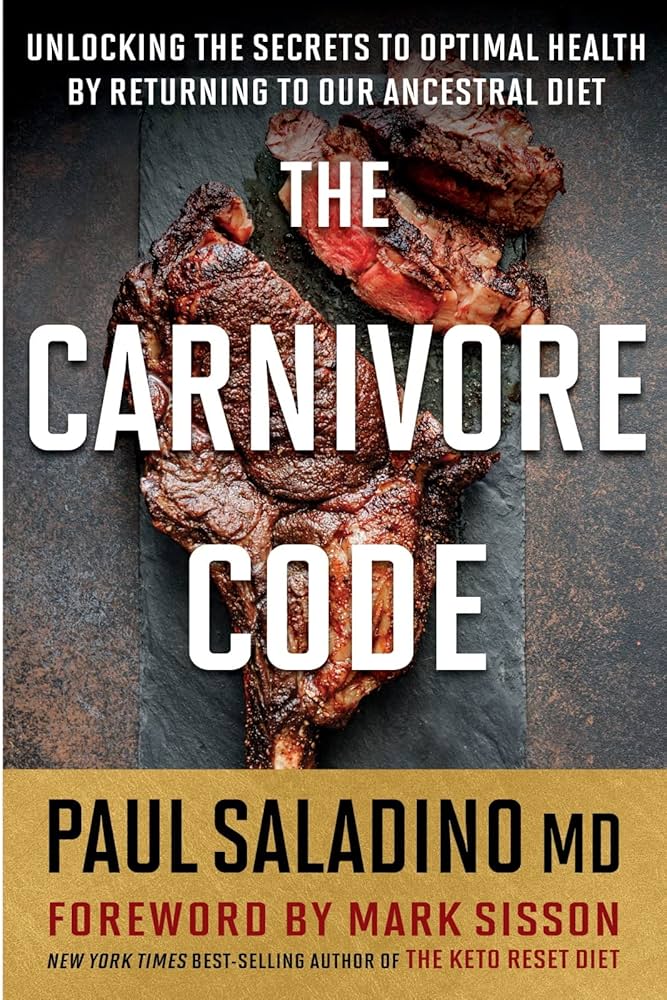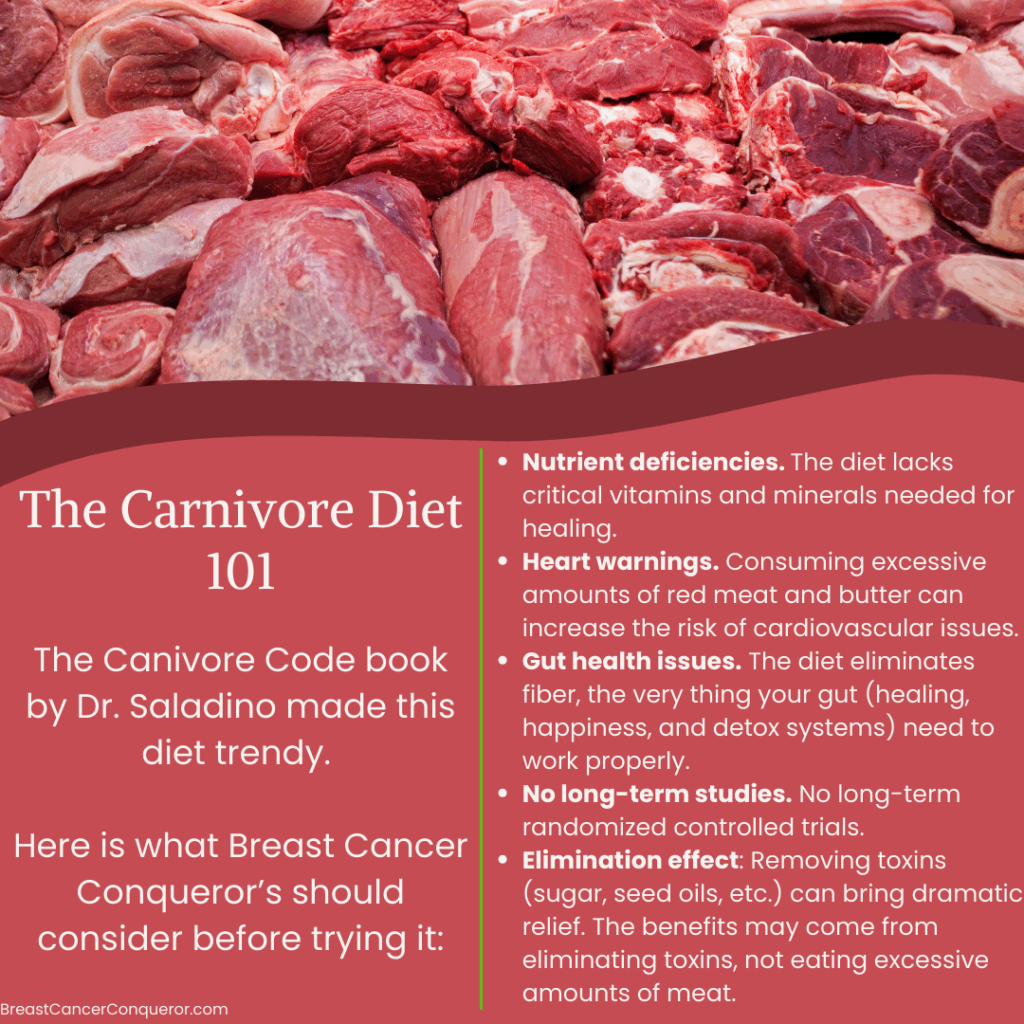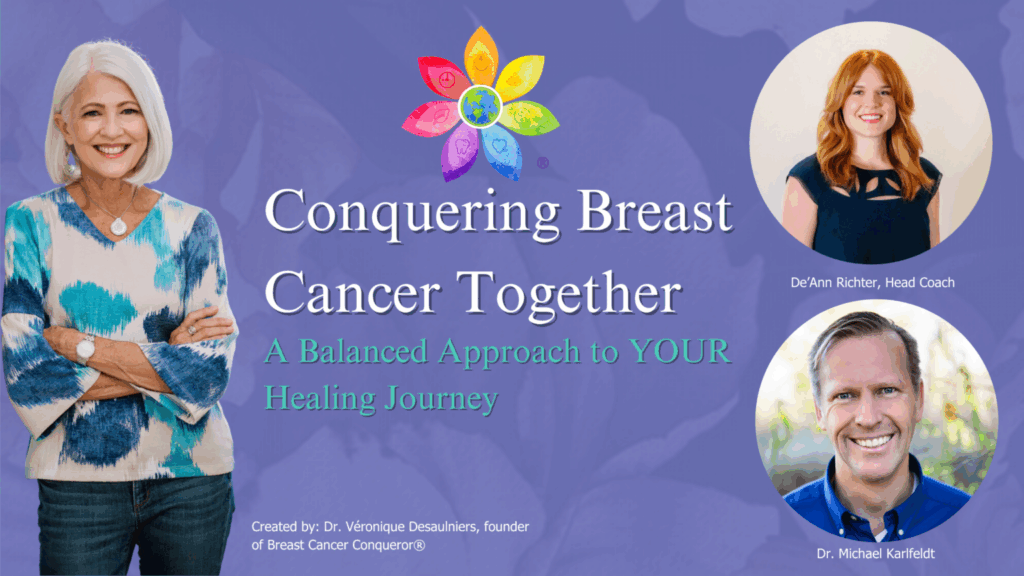Quick Read:
- The carnivore diet is the most extreme form of the keto diet. It excludes plants entirely—no vegetables, fruits, grains, nuts, legumes, or seeds.
- A positive of the carnivore diet is that it removes sugar, processed foods, seed oils, and other toxic things from your diet. However, it also excludes healing vitamins, minerals, and fiber.
- Heart and gut health concerns are some of the top issues, and so is the lack of scientific evidence and long-term studies.
At Breast Cancer Conqueror, we provide evidence-based information to help you work with your medical team and make empowered decisions for your healing journey.

This may be a controversial topic, but one I know many of you are curious about: the carnivore diet, which gained popularity through Dr. Paul Saladino’s book, The Carnivore Code. Since then, new research and real-world experiences have provided us with more to reflect on, which is shared below. But no matter how you choose to eat, start your journey with tests that tell you precisely what your uniquely magnificent body needs.
Continue reading to discover more about the carnivore diet, our recommended food tests, and other eating plans, allowing you to mix and match and make informed decisions for your healing.
Who Is Dr. Paul Saladino?
Dr. Paul Saladino is a medical doctor who gained fame in 2020 by promoting the carnivore diet, which advocates for a return to our ancestral diets. His book, The Carnivore Code, argued that humans thrive on an animal-based diet and that many plant foods contain “toxic” compounds.
However, as we all change, so did Dr. Saladino in his research and lifestyle habits. In early 2025, Saladino himself admitted that following a strict all-meat diet led to health issues for him: sleep disturbances, heart palpitations, muscle cramps, and even lowered testosterone. He has since reintroduced fruit and honey into his diet. Dr. Saladino has also publicly stated that long-term ketosis may not be beneficial for him and likely not for most humans.
This is essential context. Even one of the most visible advocates of the carnivorous lifestyle found it unsustainable in the long term. That being said, he continues to advocate for consuming animal organs due to their purported benefits for immunity, gut health, and bone strength.
What Exactly Is The Carnivore Diet?
Think of the carnivore diet as the most extreme form of the keto diet. It excludes plants entirely—no vegetables, fruits, grains, nuts, legumes, or seeds. Meals consist solely of meat, fish, eggs, and (depending on the version) dairy.
Proponents claim this way of eating:
- Lowers inflammation
- Improves autoimmune conditions
- Promotes weight loss
- Stabilizes blood sugar
- Increases mental clarity
But critics worry (and so do we) about the lack of fiber, antioxidants, and phytochemicals—nutrients found only in plants and known to play a role in preventing chronic disease, including cancer. For example, vegetables, especially cruciferous ones, are extremely important for breast cancer recovery, natural detoxification, and overall vibrant health. Please review this blog post to learn more [1].
The Updated Research: Short-Term Benefits Of The Carnivore Diet
Since 2020, more studies, surveys, and case reports have emerged. Here’s what they show about short-term benefits:
- Weight loss and blood sugar: In small observational studies and self-reported surveys, many participants saw rapid weight loss, improved insulin sensitivity, and more stable blood sugar. For people with metabolic syndrome or pre-diabetes, that can feel like a breakthrough. (Study [2])
- Inflammation: Some individuals reported reduced joint pain, skin issues, or autoimmune symptoms. This may be due to the elimination of processed foods and common allergens, such as gluten and soy. (Study [2]) Soy can be another controversial topic because most people group all types of soy into one category. However, soy can be a great healer or a harmer of your journey, so please take a moment to learn more about it via this blog post. [3]
- Satiety: Protein-heavy meals increase satiety hormones, making people feel fuller for longer and naturally reducing calorie intake.
- Elimination effect: Removing processed foods, sugar [4], alcohol, and inflammatory seed oils [5] can bring dramatic relief. Perhaps, the underlying benefit isn’t the meat, but the removal of toxins.
These benefits are real for some people, at least in the short term. But remember—what feels good for three months may not feel good three years down the line.

The Risks & Unknowns Of The Carnivore Diet
Here’s where caution is warranted, especially for those on a breast cancer healing journey.
1. Heart Health Concerns
Experts from Harvard and other major institutions warn that the diet’s reliance on red meat, butter, and other saturated fats can raise LDL cholesterol and ApoB, key drivers of cardiovascular disease. For women healing from breast cancer, heart health is especially critical, since some cancer treatments already put extra strain on the heart.
2. Gut Health Challenges
Eliminating all fiber means removing the very fuel your gut microbiome thrives on. A healthy microbiome supercharges your immune system, elevates your mood, produces anti-inflammatory compounds, supports cancer treatments, and helps detoxify xenoestrogen—key in preventing and managing breast cancer. Without fiber, dysbiosis and constipation are also likely. To learn more about your gut health and microbiome, take a few minutes to read these blogs:
- Go With Your Gut Feeling: Gut Health [6]
- Gut Health, Parasites & The Cancer Connection [7]
- Emerging Research: Your Breast Microbiome and Breast Cancer [8]
3. Nutrient Deficiencies
Even with organ meats included, the carnivore diet lacks critical vitamins and minerals such as vitamin C, folate, magnesium, and potassium, as well as plant compounds like flavonoids, carotenoids, and polyphenols.
Tens of thousands of studies (and common knowledge) have shown that vitamins and minerals found in fresh produce help heal cancer and support vibrant health. This is why Essential #1 of the 7 Essentials System® [9] is Let Food Be Your Medicine because what you choose to eat can either harm or heal your body.
4. Scientific Gaps
Perhaps the biggest red flag: there are no long-term randomized controlled trials of the carnivore diet. Most of what we know comes from anecdotal reports, short-term trials, and extrapolations from ketogenic diets. Without strong, long-term evidence, the carnivore diet remains an experiment.
Test and Find Your Balance
At Breast Cancer Conqueror, we focus on testing, personalization, and balance, so you can eat to thrive. While some find good results with short-term extreme diets, most find that a balanced approach, including cruciferous vegetables, leafy greens, berries, omega-3 fats, and moderate clean protein intake, works for them long-term. These are consistently linked with reduced cancer risk, improved survival, and better overall health.
Here are a few of our top recommendations:
- Don’t guess and stress—TEST. Take the Nutrition Genome Test to discover the right eating plan for your DNA. Get all the details here [10].
- Test your blood sugar and shatter cancer growth. Sugar revs up your blood sugar and can stimulate breast cancer cell growth. Therefore, test your blood sugar to determine what you should/should not eat. Click here [11] to learn how and why.
- Eat these specific foods during chemotherapy. Strategically eat to enhance effectiveness and reduce harmful side effects. Learn more via this blog post [12].
- Devour flaxseeds. These tiny seeds contain a shocking amount of cancer-healing nutrients: Fiber, Vitamin B1, zinc, thiamine, copper, selenium, antioxidants, phosphorus, phytoestrogens, magnesium, and omega-3s. Get all the details here [13].
- Power up with quality protein. Yes, a strategic amount of animal protein is helpful to many women’s healing journey and overall health. Take a moment to read this blog post [14] and this one [15] to learn why.
- Eat for the mood you want. The food-mood connection is real. Click here [16] to learn how to eat for happiness, emotional well-being, and stability.
- Go all out with algae. Reel in algae’s powerful healing benefits via these blogs:
Our Closing Thoughts [20]
[20]
Here’s what we do know for sure: balance, personalization (testing!), and self-love are more powerful than any one diet trend. If you’re healing from breast cancer, your body deserves the food that will best support its unique needs. For endless ideas, dig into our Healthy Breast Recipes [21].
For more expert-level insights into realistic eating, fasting techniques, and managing blood sugar for breast cancer healing, start our online course: Conquering Breast Cancer Together—A Balanced Approach to YOUR Healing Journey. [20]
Bon appétit!